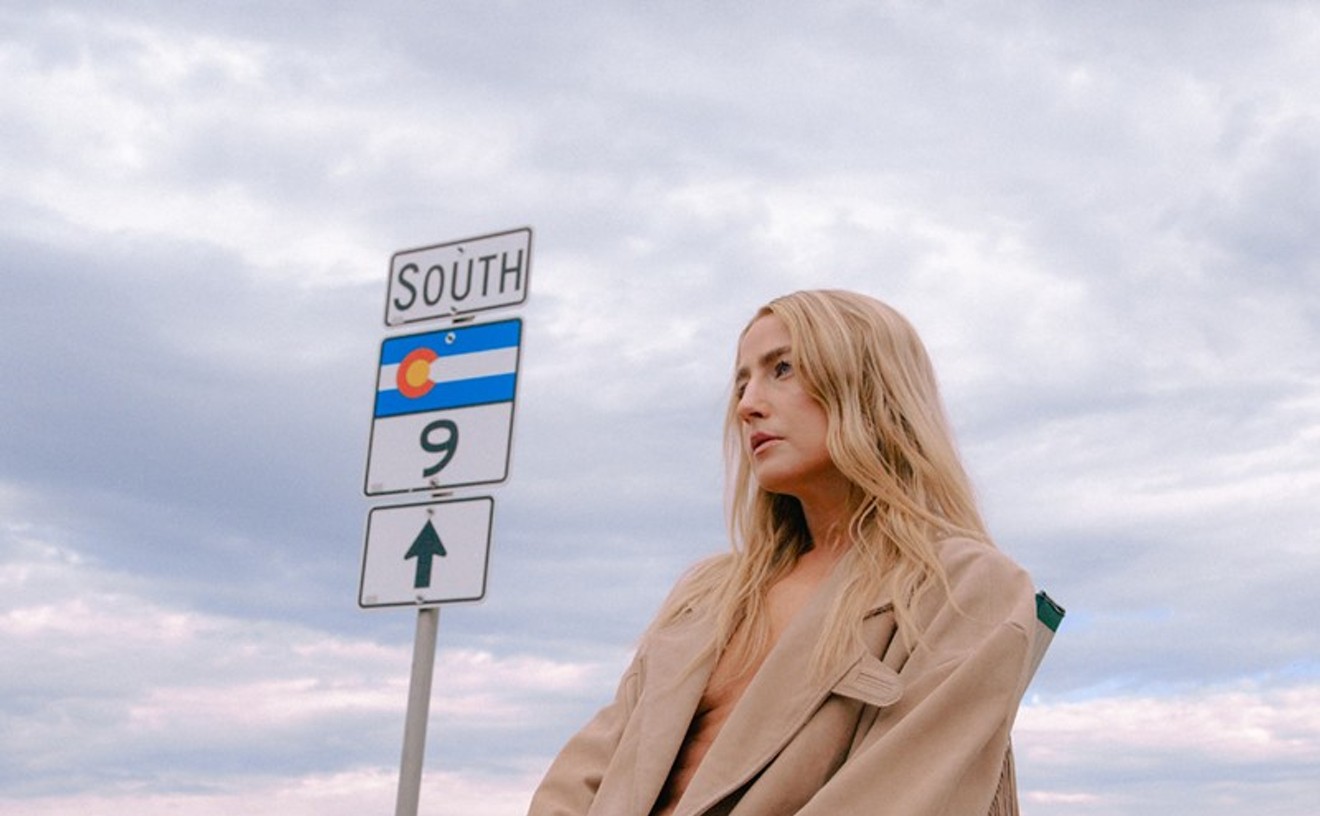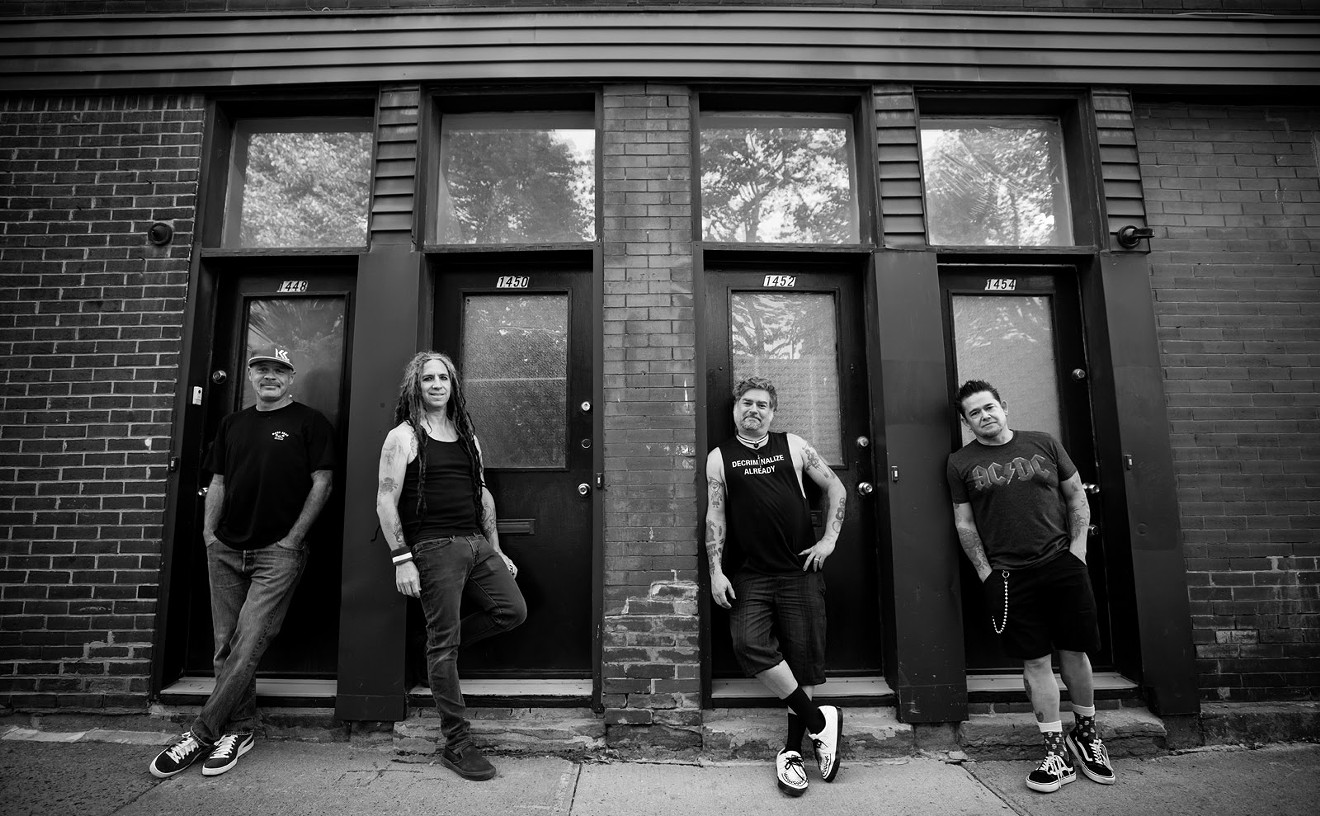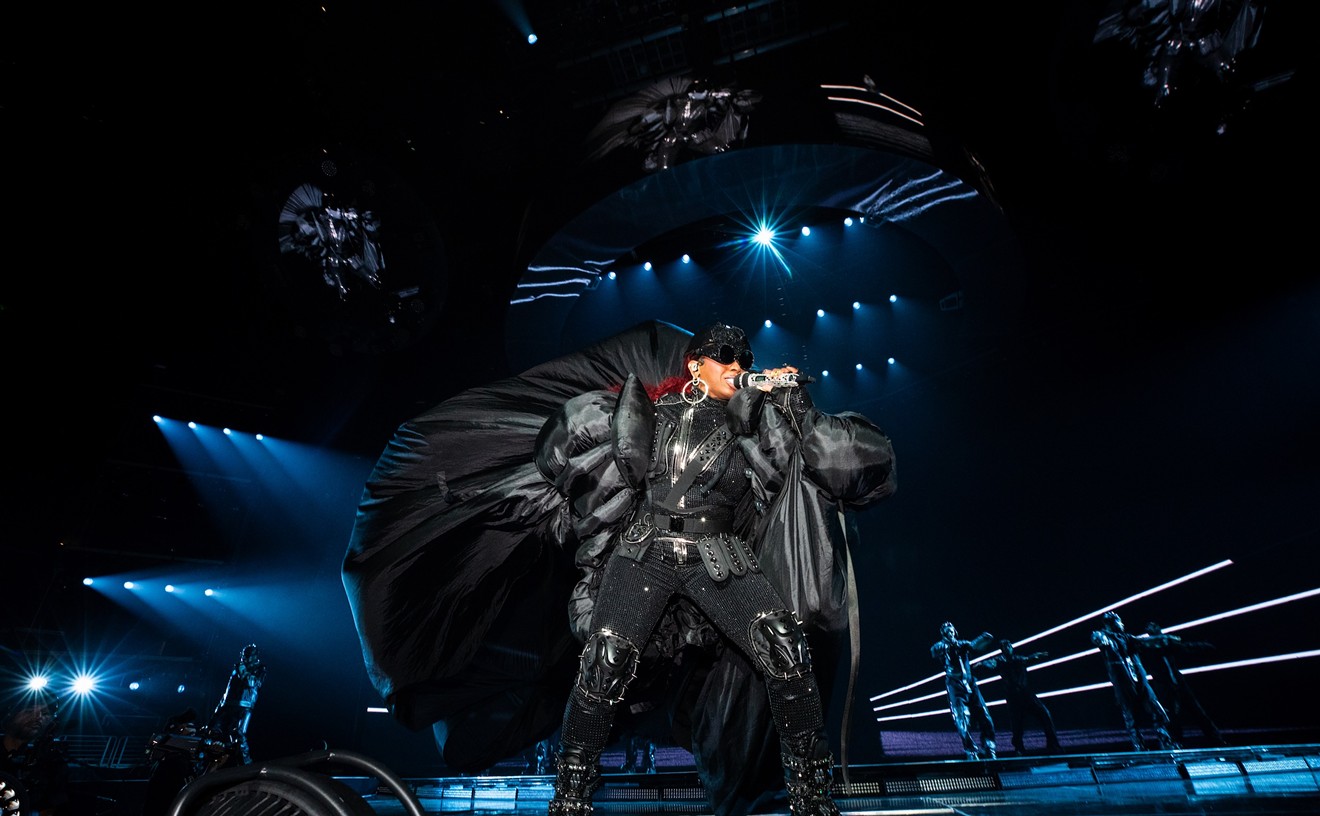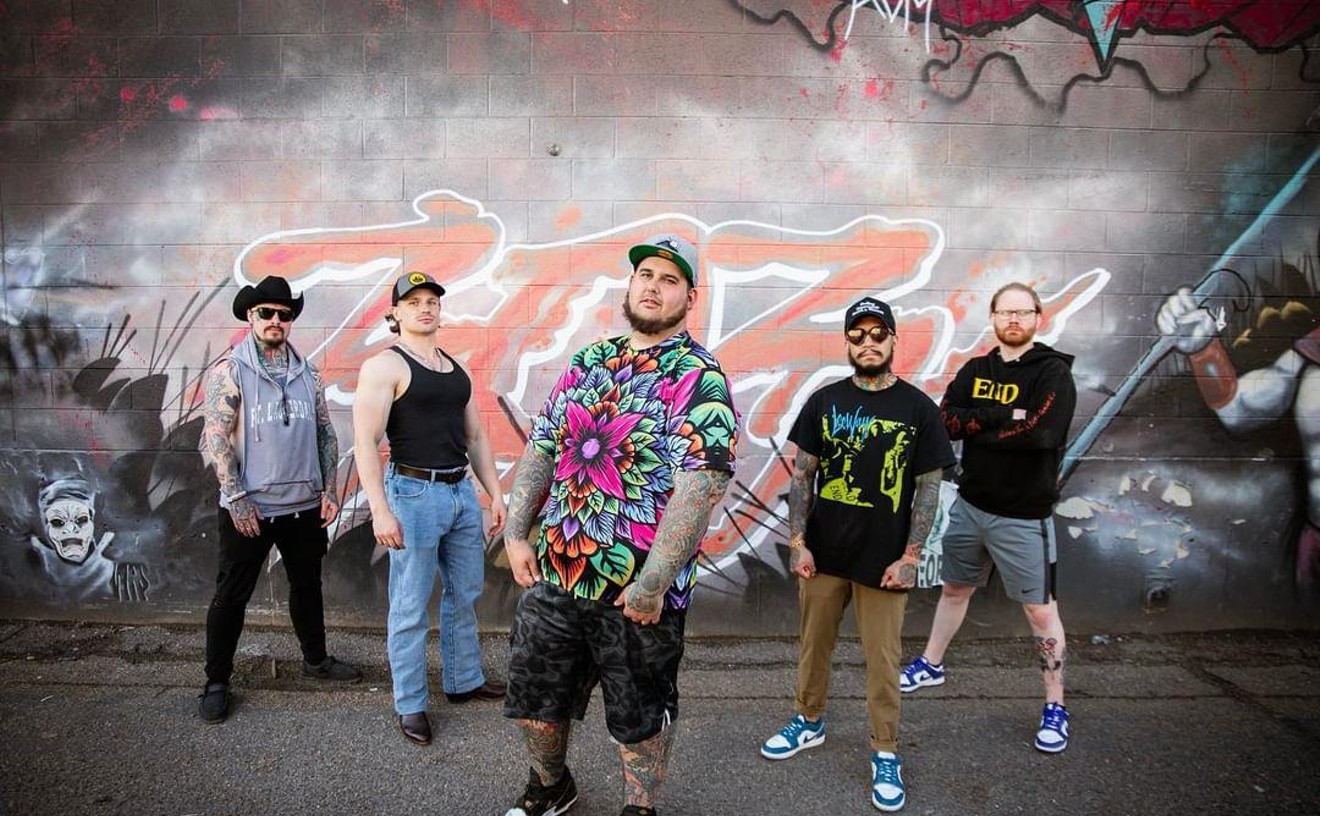Doomtree appears this Friday, March 6, at the Gothic Theatre. For more than a decade, the septet has been one of the most exciting and innovative hip-hop crews in the country. Hailing from Minneapolis, the seven members of Doomtree grew up in the same metropolitan area that produced Atmosphere and the Rhymesayers Entertainment collective, which have both had a major impact on underground hip-hop on a national as well as international level.
From 2005 to 2015, Doomtree held what it calls a "Blowout" show at a medium-sized theater. The final of those was held this past December. At Blowout 8, m 2012, former Minneapolis mayor R.T. Rybak declared it was Doomtree Day.
"We had no intention of them being an annual thing by any means," says Aaron "Lazerbeak" Mader of the Blowouts. "We spent the first year or two opening up for anyone that would have us and to play as many shows as we could. Honestly, we were most curious to find out what our draw was — who would come to see us play. We called it the Blowout because it was going to be all of us there and we were going to take over the whole night. I remember sound-checking, and none of us really knew what was going to happen regarding ticket sales. We went out to eat, and when we came back there was a line around the block, and it sold out before the doors opened. That was probably a 700- or 800-person room, and at that point we were still used to playing to thirty or forty people. That was the first indication that we were connecting."
And connect Doomtree did, quickly becoming one of the more popular hip-hop acts in its home city and beyond. But it was time for the Blowout event to end, because the Doomtree crew couldn't push the envelope of that format any further than it had already taken it.
Everyone involved in the collective grew up in the Minneapolis area, Mader in nearby Hopkins. Legendary record store Oar Folkjokepus loomed large as a destination where Mader discovered the music that would shape his thinking about music through his own discovery and the recommendations of clerks. The place is also heavily referenced in the lore of Minneapolis music, with connections to The Replacements and Hüsker Dü as well as later groups.
One fateful day, Alan Sparhawk strolled into the store and spoke with one of the clerks about getting an opener for Low's then-upcoming Christmas show; the clerk gave him the name of one of Mader's old bands, the Plastic Constellations.
"All of a sudden I get a call from him at my folks' house asking if we'd like to open for Low at that show," recalls Mader. "I hung up on him the first time because I thought it was a prank. So we're playing the main room, and I think I broke three strings and Jeff''s [Allen] strap broke. It was a total debacle, but through that I really learned how to deal with a crowd in crisis, and I think Doomtree is built on that also. Our stage show falls apart a lot. It's not always well rehearsed or polished, but it's part of our charm at this point. We roll with it, essentially."
And that seems to be the way of Minneapolis. Some of the city's musical heroes are surprisingly down-to-earth and accessible and seemingly not too snobby to play with a bunch of kids, even as an established artist.
Mader's interest in hip-hop got stronger as he became exposed to the classic 1999 Roots record Things Fall Apart. Mader read the liner notes and followed the rabbit hole down through Common, Mos Def and others.
"I fell so head over heels again with it in high school, and I wanted to contribute to that culture," says Mader. "But I knew I wasn't going to be a rapper, and I was too afraid to spray-paint and make graffiti. I was a terrible dancer, so where do you fit in? I'd been making songs forever and played saxophone."
That's when his friend Stefon Alexander, better known to the world as P.O.S., told him that he knew how to make music and that it would be easy for him. Alexander, Mader and Mader's mother went to Guitar Center and got an MPC that Mader paid off over the next year with money from his movie-theater job, and he hasn't exactly looked back. Instead, he developed into the renowned producer that he is today, along with P.O.S.
Though Doomtree's latest record, All Hands, was long in the making, with Cecil Otter and Mader starting the initial beats two years ago, it's the outfit's most cohesive record, with a richness of sound ideas and strong songwriting. It may be the group's strongest offering yet. And it's the mature work of a group of people who know each other's creative processes well even as the dynamic among them has evolved and changed over the years — especially now that everyone in the crew is in his or her thirties.
"It took a year more than I thought it would to finish the record," says Mader. "As we get older and more rooted in our own lives, and with everything going on, the harder it is to get us all together and make music that we all really love and believe in. That doesn't just happen. A lot of stuff gets scrapped. The challenge is making it. The reward and celebration is performing it live. I don't think any of us would say we're in love with the in-depth creative process. But when you get us on stage, you see the joy in what we do in sharing that with people. I think that's where we're most comfortable, on stage with each other."
Doomtree, 8 p.m. doors, 9 p.m. show, Friday, March 6, Gothic Theatre, 303-789-9206, $20, 16+
Follow @Westword_Music
If you'd like to contact me, Tom Murphy, on Twitter, my handle is @simianthinker.
[
{
"name": "Air - MediumRectangle - Inline Content - Mobile Display Size",
"component": "12017618",
"insertPoint": "2",
"requiredCountToDisplay": "2",
"watchElement": ".fdn-content-body",
"astAdList": [
{
"adType": "rectangle",
"displayTargets": "mobile"
}
]
},{
"name": "Editor Picks",
"component": "17242653",
"insertPoint": "4",
"requiredCountToDisplay": "1",
"watchElement": ".fdn-content-body",
"astAdList": [
{
"adType": "rectangle",
"displayTargets": "desktop|tablet"
},{
"adType": "rectangle",
"displayTargets": "desktop|tablet|mobile"
}
]
},{
"name": "Inline Links",
"component": "18838239",
"insertPoint": "8th",
"startingPoint": 8,
"requiredCountToDisplay": "7",
"maxInsertions": 25
},{
"name": "Air - MediumRectangle - Combo - Inline Content",
"component": "17261320",
"insertPoint": "8th",
"startingPoint": 8,
"requiredCountToDisplay": "7",
"maxInsertions": 25,
"watchElement": ".fdn-content-body",
"astAdList": [
{
"adType": "rectangle",
"displayTargets": "desktop|tablet"
},{
"adType": "rectangle",
"displayTargets": "desktop|tablet|mobile"
}
]
},{
"name": "Inline Links",
"component": "18838239",
"insertPoint": "8th",
"startingPoint": 12,
"requiredCountToDisplay": "11",
"maxInsertions": 25
},{
"name": "Air - Leaderboard Tower - Combo - Inline Content",
"component": "17261321",
"insertPoint": "8th",
"startingPoint": 12,
"requiredCountToDisplay": "11",
"maxInsertions": 25,
"watchElement": ".fdn-content-body",
"astAdList": [
{
"adType": "leaderboardInlineContent",
"displayTargets": "desktop|tablet"
},{
"adType": "tower",
"displayTargets": "mobile"
}
]
}
]











